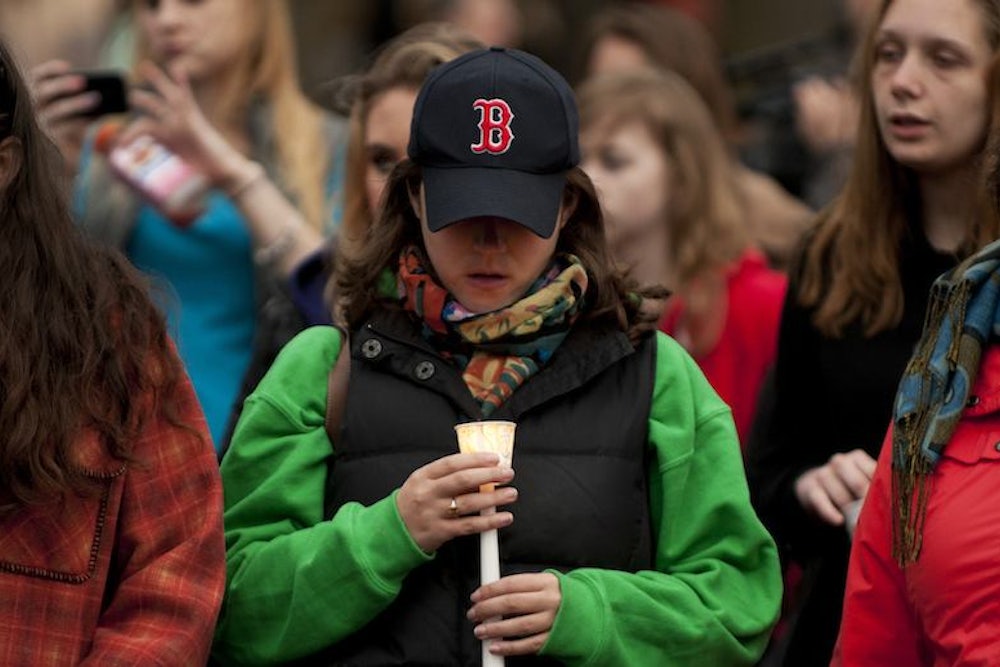When the Boston Red Sox snapped the “Curse of the Bambino” by winning the World Series in 2004, their first since 1918, I remarked to a friend that the worst thing about it would be the inevitable New Yorker essay by Roger Angell, a longtime, vocal Red Sox fan. This was wrong—Angell actually got two essays out of it—and also unfair, because Angell is a great writer. But that’s the point: Something about being a Boston sports fan makes talented writers and wonderful human beings (and occasionally people who are both) briefly insufferable to the rest of the world.
Bostonians’ self-importance about their sports teams—a self-importance untethered to the bombast that comes from being a mega-city, making it fundamentally different from, say, New York fans’ obnoxious arrogance—led them to overstate their teams’ slights and misfortunes and to understate their resounding success in sports other than football and baseball (somehow, justifiable “Celtic Pride” never diminished Boston fans’ sense that the metaphysical fix was in). Boston sports fandom, in other words, was very annoying. And when the Patriots and the Red Sox finally began winning titles last decade, it was like the point in the movie where the secret weapon doesn't destroy the monster, but makes it even stronger. Suddenly Red Sox fans were said to comprise “Red Sox Nation,” and that was even more annoying.
The Boston Marathon attack was, among other things, a Boston sports tragedy. Sports Illustrated put it on the cover, ESPN.com led with the story until sometime on Wednesday, and some of the best coverage has appeared on Deadspin. The bombs were an assault on the most prestigious annual marathon in the world, but even that does not do justice to the sports angle. Monday was Patriots’ Day, a Massachusetts state holiday (and a holiday in former Massachusetts enclave Maine) otherwise known as Marathon Monday, and less officially known as The Day The Red Sox Start Their Game at 11 a.m.
Duly, the shows of solidarity with Boston have been expressed through sports, which has meant dipping into the sappy language of Boston fandom. The most prominent show of support in New York came last night in the Bronx, when the New York Yankees played Neil Diamond’s “Sweet Caroline,” the Red Sox’ eighth-inning song (itself a nouveau affectation, inaugurated in 2002). Yesterday, the Chicago Tribune sports section declared, “We are Chicago Red Sox, we are Chicago Celtics,” and so on. In my neighborhood of Fort Greene, Brooklyn, where there is a dearth of sports bars, messages of support projected onto the Brooklyn Academy of Music's façade used the distinctive Red Sox “B” to signify Boston.
These gestures, steeped as they are in the myth that in Boston sports are More Important, should annoy me deeply. But the past few days have taught me a few things on this subject. One is that it may be true that sports are More Important in Boston, a bad-weather small city that used to be a major hub but now is merely “The Hub”—quotation marks and all—and one that has seen its share of civic strife and corruption over the years. Perhaps the city “clings” to its sports teams, as President Barack Obama might put it, to validate their identity as citizens of a town that The Onion recently satirized as a place where residents play "their adorable little game of 'Big City,' a live-action role-playing adventure in which Bostonians buzz about their daily routines in a delightful hubbub of excitement as if they lived in a major American metropolis."
I've also learned, though, that what truly annoys me about Boston sports fans is not their inflated self-importance, but their earnestness about it—specifically, their earnestness untempered by self-awareness, bereft of irony.1 In the aftermath of 9/11, it was said that the attacks killed irony, or proved that irony was dead. That was wrong: Irony is alive, and thriving. What 9/11 did, more modestly but more importantly, is clarify that there is a time for irony, and a time for earnestness, and times for both in varying proportion. After tragedies, earnestness provides comfort where irony cannot, and no arena of American culture is more earnest than sports, and no city is more earnest about its sports than Boston. So let’s all be Boston fans—until the Celtics get knocked out of the playoffs, anyway.
All sports fans are overly earnest. But Yankees fans understand they are obnoxious, Lakers fans understand they are lackadaisical, and everyone other than, seemingly, Boston fans has moments where they question the sincerity of their fandom.
CORRECTION: An earlier version inaccurately reported that "Sweet Caroline" is played during the seventh-inning stretch. The Sox are too good for that.
